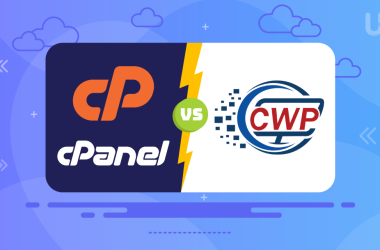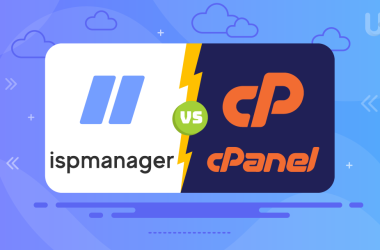In today’s digital world, choosing the best cPanel VPS hosting plan is crucial since it significantly impacts the performance and profitability of your online businesses. Your hosting decision must be solid and cater to your particular demands because it will be the foundation of your online presence.
However, this blog article explores the crucial elements influencing your choices. We provide a complete guide to help you make an informed choice, from understanding the subtleties of cPanel VPS hosting to assessing performance, scalability, security, and cost.
In this post, we will explore everything about the hosting landscape, assuring maximum speed and dependability for your website.
Understanding VPS Hosting
Virtual Private Server (VPS) hosting offers a robust, intermediate hosting solution between shared hosting and dedicated servers. In a VPS environment, a physical server is divided into multiple virtual servers, each operating independently.
This division ensures that your hosting resources, such as CPU, RAM, and disk space, are dedicated solely to your website, providing enhanced performance and reliability.
Introduction to cPanel
cPanel, short for Control Panel, is a web-based interface that simplifies server and website management. It offers various tools and features for easy domain management, email setup, and file management.
cPanel streamlines complex server tasks, making them accessible to users with varying technical expertise. Its user-friendly server administration approach is popular among both webmasters and corporations.
Benefits of Using cPanel VPS Hosting
Choosing a cPanel VPS hosting plan provides several advantages.
- Firstly, it offers an intuitive, graphical interface that simplifies server management, reducing the need for advanced technical skills.
- Secondly, cPanel enhances website security with robust features like firewall configuration and SSL certificate installation.
- Lastly, it facilitates easy backups and restores, ensuring your data remains safe and recoverable.
Understanding these foundational aspects of cPanel VPS hosting is crucial as we delve deeper into factors influencing your hosting plan choice.
Looking for the best cPanel VPS Hosting?
If you’re searching for the best cPanel VPS Hosting, look no further than Ultahost. With top-notch performance, excellent support, and a user-friendly cPanel interface, Ultahost ticks all the boxes. Make your hosting choice with confidence and unlock the full potential of your website.
Factors to Consider When Choosing a cPanel VPS Hosting Plan
Performance and Resource Allocation
Performance and resource allocation encompasses the fundamental elements of overseeing your server’s computational assets and storage preferences. This is where we explore CPU and RAM allocation, as well as the key considerations between Disk Space and the benefits of SSD vs. HDD storage options.
1. CPU and RAM Allocation
Selecting the right cPanel VPS hosting plan begins with understanding your website’s resource needs. The first crucial aspect to consider is the allocation of CPU and RAM.
- CPU (Central Processing Unit): The CPU is the brain of your virtual private server. It determines how quickly your server can process data and execute tasks. Assess your website’s demands and choose a plan with adequate CPU cores.
- RAM (Random Access Memory): RAM directly impacts your server’s ability to handle concurrent visitors and run applications efficiently. Ensure your hosting plan provides enough RAM to support your website’s expected traffic and workload.
2. Disk Space and SSD vs. HDD
Storage plays a pivotal role in hosting. Disk space and the type of storage drive are essential considerations.
- Disk Space: Evaluate your website’s data storage needs. Choose a hosting plan with sufficient disk space to accommodate your files, databases, and backups. Consider future growth when estimating space requirements.
- SSD vs. HDD: Solid-state drives (SSD) are faster and more reliable than Hard Disk Drives (HDD). Opting for an SSD-based hosting plan can significantly boost your website’s performance.
Bandwidth Allocation
Bandwidth determines the data transfer capacity of your server. It influences how quickly your website loads and how much traffic it can handle. Ensure your hosting plan includes enough bandwidth to support your anticipated traffic volume without incurring overage charges or slowdowns.
Scalability: Meeting Future Demands
When selecting a cPanel VPS hosting plan, one of the paramount considerations is scalability. The scalability of your hosting service influences how effectively it can react to the changing demands of your website. There are two main considerations:
Vertical Scaling vs. Horizontal Scaling
Vertical scaling involves upgrading the resources of your existing server. This includes increasing CPU, RAM, or storage capacity. It’s a suitable choice if your website experiences growth in traffic or data storage needs but doesn’t require a completely new server.
Horizontal scaling, on the other hand, entails adding more servers to your hosting environment. This approach benefits websites with rapidly increasing traffic that may require load balancing across multiple servers.
Upgrading Options
To ensure your hosting plan can accommodate growth, investigate the provider’s upgrade options. Assess how easily you can scale your resources up or down as needed. Look for providers that offer seamless transitions with minimal downtime to avoid disruptions to your website.
By carefully considering scalability, you can future-proof your hosting solution and prevent the need for frequent migrations or service interruptions. This proactive approach ensures your website’s performance remains consistently reliable.
Server Location and Data Centers
Selecting a cPanel VPS hosting plan requires an assessment of server location and the quality of data centers. The geographical proximity of the server to your target audience significantly influences website speed and performance. Opt for a hosting provider with data centers strategically located to cater to your primary audience.
Reliable data centers should possess redundant power sources, advanced cooling systems, and data security measures. These elements ensure uninterrupted service and safeguard your data against unforeseen circumstances.
So, always inquire about a hosting provider’s data center infrastructure and their commitment to redundancy and security protocols to ensure your website’s seamless operation and data integrity.
Security Features
When selecting a cPanel VPS hosting plan, security features should be paramount. Robust security safeguards your website from threats and vulnerabilities. Here are key security aspects to evaluate:
Firewall and DDoS Protection
Ensure the hosting provider offers a reliable firewall and robust DDoS protection. These defenses shield your website from malicious traffic and cyberattacks, maintaining its availability and integrity.
SSL Certificates
Look for hosting plans that include SSL certificates. These cryptographic protocols secure data transmission between your site and visitors, fostering trust and data privacy.
Backup and Disaster Recovery
Assess the backup and disaster recovery options. Regular backups and swift recovery mechanisms can prevent data loss during unforeseen incidents.
Support and Customer Service
Exceptional support and customer service are vital when choosing a cPanel VPS hosting plan. Your website’s performance and security depend on quick, efficient assistance when issues arise.
Look for providers offering 24/7 technical support with rapid response times. Responsive support ensures minimal downtime and swift problem resolution. Consider the provider’s support channels, such as live chat, phone, and email. Evaluate their knowledge base and documentation for self-help options. Customer reviews and testimonials can provide insights into the quality of their support.
Reliable support and prompt assistance will help you maintain a stable and secure online presence, making it a crucial factor in your hosting plan decision.
Pricing and Billing Structure
When selecting a cPanel VPS hosting plan, the pricing and billing structure need careful consideration. Understanding the financial aspects ensures a cost-effective and sustainable hosting solution.
Types of Billing
Providers offer various billing options, including monthly, annual, or multi-year plans. Assess your financial flexibility and commitment before opting for a plan.
Beware of hidden charges that can inflate your hosting costs. Scrutinize the terms and conditions for additional costs such as setup fees, domain registration fees, or overage charges.
Money-Back Guarantee
Explore providers that offer a money-back guarantee. This policy safeguards your investment and demonstrates the provider’s confidence in their service.
Making an informed decision regarding pricing and billing can prevent financial surprises and ensure a smooth hosting experience.
Conclusion
In conclusion, selecting the right cPanel VPS hosting plan is pivotal for your online success. Consider your needs, performance, security, and pricing carefully. Make an informed choice to ensure a seamless and prosperous online presence. Your website’s performance and stability depend on it. Choose wisely.
At Ultahost, we prioritize your online success. Our cPanel VPS Hosting blends user-friendliness with robust VPS capabilities, perfect for businesses of all sizes. Opt for Ultahost and elevate your online presence with confidence. Your website’s success is our commitment.
FAQs
Most hosting providers allow you to upgrade or downgrade your cPanel VPS plan as your needs change. Choosing a provider that offers flexible scaling options and transparent terms for such transitions is essential.
Yes, cPanel VPS Hosting is an excellent choice for e-commerce sites. It provides the performance and security necessary for handling online transactions, customer data, and the dynamic nature of e-commerce platforms.
cPanel VPS Hosting shares server resources with other users on the same server, while dedicated hosting offers an entire server exclusively for your website. VPS hosting is more cost-effective, while dedicated hosting provides higher performance and resource isolation at a higher cost.
Hosting providers typically offer customer support, including live chat, email, and phone support. You can also find online resources and tutorials for cPanel users.









